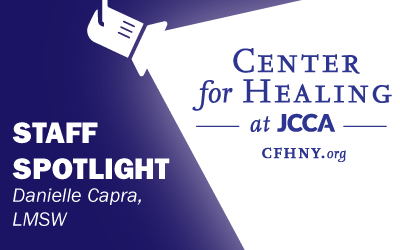To recognize National Child Abuse Month, JCCA sat down with Danielle Capra, LMSW, a social worker at the Center for Healing. We discussed the impact of childhood sexual abuse on victims, treating trauma, and a positive moment with a client. Our conversation has been edited for clarity and length.
JCCA: What is The Center for Healing?
DC: We work with children who have experienced childhood sexual abuse, as well as children who have been sex trafficked. We provide therapeutic services to children and families. A lot of people think we are just on JCCA’s Campus, but we treat clients from any JCCA program.
JCCA: What types of therapy do you or the center offer for clients?
We offer Trauma-Focused Cognitive Behavioral Therapy (TF-CBT), Game-Based Cognitive Behavioral Therapy for Childhood Sexual Abuse (GB-CBT), Eye Movement Desensitization and Reprocessing (EMDR), and Psychodynamic Therapy.
We utilize these specific treatments because they are evidence-based. This means that extensive research was done on these treatments, and they were proven to be effective. Every client is different, which is why it is important for us to be well versed in more than one treatment approach.
JCCA: Do you have to receive extra training to provide any of these therapeutic techniques?
DC: Yes, we did have to go through extra training to learn the above treatment modalities. Due to the nature of our client’s trauma(s), specialized training and continued professional development are required.
JCCA: Take me through your decision to get your MSW and begin this career.
DC: It’s a long story. I went to school for Communications. I pursued journalism, then cosmetology, doing makeup for photoshoots, and I did personal training at people’s houses. I don’t remember exactly when, but there was a moment that slapped me in the face and said, “Danielle, stop messing around! Social work is what you are supposed to be doing.” Before I came to JCCA three years ago, I was working with a family in Rockland County while studying for my licensing exam. The two kids both had trauma histories, but they didn’t face the same challenges as the kids I see here.
JCCA: How does commercial sexual exploitation impact a child? What trauma symptoms do you often address?
DC: When a child experiences sexual abuse you may see low self-esteem, unexplained aggression/anger, self-harm, incontinence, substance abuse, sexualized behaviors, running away, etc. But we see and treat all kinds of trauma symptoms. As I said before, there is no one-size-fits-all for trauma.
JCCA: Are these symptoms complicated to treat?
DC: In my experience, it normally isn’t the trauma symptom itself that makes it complicated, it’s the constant environmental stressors that continue to exacerbate the trauma symptom(s) coupled with a lack of support that ends up validating the need for these defenses. That was kind of a complicated way to say it, but to put it simply, without proper supports and a stable enough environment, treating any kind of trauma becomes complicated.
JCCA: Why is the work important to you?
DC: In general, this work is important because so many people are unaware of the problem of [Child Sexual Abuse] and how widespread it is. But also because of the kids — if their trauma is left untreated it can impact them for the rest of their lives. Personally, I can’t imagine this work not being important to somebody. I feel lucky to be part of our kids’ lives.
JCCA: Are there ever times when the work is hard? If so, how do you stay grounded?
DC: Yes, there are definitely times when it is hard to hear how much the kids are hurting. It’s hard because we naturally all want to make it stop when we see someone hurting in front of us, but I remind myself that just being there and creating a safe environment is some comfort to them. I’m glad to provide a space where they can let all of it out. And when days are really hard, my dog keeps me positive. I go home and cuddle her.
JCCA: What’s a positive moment you’ve had lately?
DC: A client I’ve been working with could not tolerate anyone saying anything nice about her when we first started. This is because when trauma happens, it takes pieces of ourselves with it. Those pieces are commonly our self-esteem, sense of safety within ourselves, as well as with others, etc. So, when a child grows up being abused, a common belief they hold is that they are not worthy of love or praise….and when abuse is all you’ve ever known, receiving anything other than that feels threatening. Fast forward to now, she sat in my office the other day talking about how great she is. She can take compliments now and will just light up like a Christmas tree.
